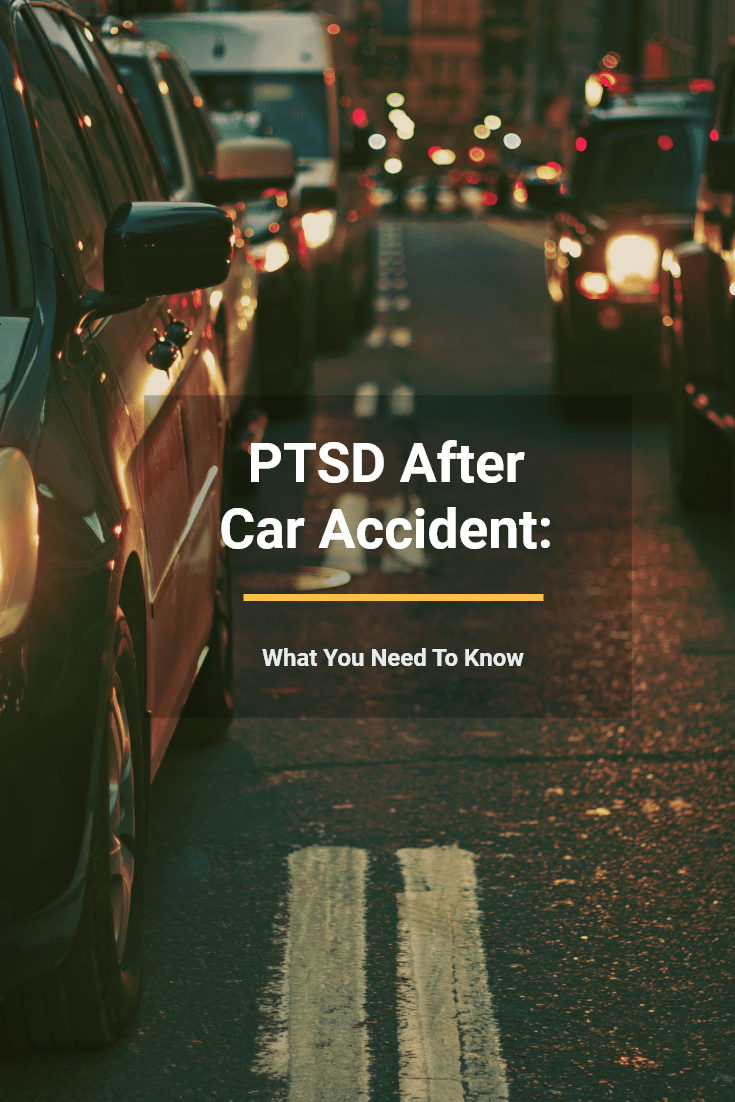PTSD After Car Accident: Understanding The Impact

Post traumatic stress disorder (PTSD) after a car accident is extremely common especially if the crash was severe and resulted in significant injuries or loss of life or if the person involved in the crash felt a sense of intense fear, helplessness, or horror during the event.
Not only are motor vehicle crashes one of the leading causes of this mental disorder, but research has shown that more than 30% of crash survivors suffer from it. Given the prevalence of this mental disorder from crash survivors and the life-altering effects that this disorder can have, it’s imperative that people understand what it is, what its symptoms are and what their treatment options are.
Additionally, it’s important that victims know their legal rights to No-Fault benefits to pay for their collision-related medical care and lost wages as well as their rights to sue the at-fault driver for pain and suffering compensation as well as other economic damages.
What is Post Traumatic Stress Disorder?
Post traumatic stress disorder is caused by experiencing or witnessing a traumatic event such as an automobile crash. This disorder causes survivors to suffer intense fear, helplessness or horror. Memories of the traumatic event can trigger it.
Can you get PTSD after a car accident?
People who are involved in a serious car accident are at a higher risk for psychological disorders such as post traumatic stress disorder (PTSD) due to the traumatizing nature of a crash. Automobile crashes are one of the leading causes of this mental disorder, affecting more than 30% of car crash victims.
What to do for post traumatic stress disorder (PTSD) after a car accident
If you suffer from post traumatic stress disorder (PTSD) after a car accident, follow these steps:
- Get examined immediately: Time may be of the essence. When it comes to properly diagnosing the cause of your post traumatic stress disorder after an automobile crash, the sooner a person gets the proper diagnostic tests and medical treatment for these symptoms, the sooner they can rule out a potentially life-threatening injury. As an injury lawyer, I always advise people that the sooner they can get the necessary and appropriate medical care, the sooner they can get back on the road to good health and a full recovery, but with this disorder the key is to rule out a much more serious injury as soon as possible.
- Get medical treatment and get a referral for the appropriate diagnostic imaging to detect and diagnose if you have suffered from this disorder. A doctor can’t treat you until he or she knows what is causing these symptoms, and the appropriate diagnostic testing will enable your doctor to prescribe the best course of treatment for you and make the appropriate referrals for you.
- Early documentation of your post traumatic stress disorder always makes it easier to avoid future problems with your own insurance company. Early medical documentation, such as in an emergency room or as soon as possible with your family doctor, will prove to a health insurance company or a No-Fault insurance company that the motor vehicle collision was the cause of your mental disorder. If it does turn out to be a more serious injury, you’ve documented the early symptoms and again will be able to avoid many of the problems that arise when an insurance company is denying a causal relationship and refusing to pay for medical treatment. Early treatment and medical documentation create the temporal relationship that insurance companies will be looking for when they are being asked to pay for necessary medical care.
- Showing a clear temporal relationship between the automobile crash and the documentation of treatment for a condition or injury also makes it easier to get a full and fair legal settlement for your injury when it is caused by another driver’s carelessness or negligence behind the wheel. Delays in seeking treatment hurt your ability to get better faster and make a good recovery, but it also often makes it harder for your attorney to get a reluctant insurance company to pay for your treatment and makes it harder to get a fair legal settlement after your automobile crash.
- Don’t try to “tough it out”: This disorder is a serious injury that may even become fatal if you don’t seek treatment right away. As a lawyer, I’ve seen so many instances where people felt like they didn’t want to “complain,” but within days or weeks what they thought would be a minor injury or something that would go away becomes far more serious.
- Talk to an attorney who is experienced at helping people injured in automobile crashes. Most experienced lawyers have helped people suffering from post traumatic stress disorder after an automobile crash. The initial call is always free so at the very least you will be informed as to what your insurance company is responsible to pay and what medical help and wage loss you are entitled to. An attorney can also help you review your medical records as well as the treatment and care you’re receiving to make sure bills are getting paid and to help you assess what your case might be worth if your pain and disability was caused by another driver’s negligence or carelessness.
- Tell your auto insurance company about your PTSD diagnosis after a car accident. If you live in the state, make sure to include this in your application for No-Fault benefits, which is also referred to as your “written notice of injury” – which must be given to your No-Fault auto insurance company “within 1 year after the accident.” (MCL 500.3145(1) and (4))
- Do not sign any settlements, releases, or waivers related to your automobile crash: Until you have talked with an experienced attorney who is looking out for your interests, do not sign any settlements, releases, or waivers that are presented to you by your auto insurance company, the at-fault driver’s auto insurer or any other insurance companies or persons.
How to make a claim for No-Fault insurance benefits
You start your claim by filing an application for No-Fault benefits with the responsible auto insurance company, according to the No-Fault law’s “priority” rules. The No-Fault insurer will pay for your medical bills and your lost wages if you cannot return to work.
Can you sue for PTSD after a car accident?
You can sue the at-fault driver for pain and suffering compensation for post traumatic stress disorder (PTSD) after a car accident. You can also pursue other economic damages such as lost wages, excess medical and future medical bills.
If your auto insurance company refuses to pay for – or cuts-off – No-Fault benefits related to the post traumatic stress disorder you have suffered and may be continuing to suffer, then you can sue for unpaid, overdue medical bills, attendant care, medical mileage, replacement services and lost wages because your injuries have prevented you from returning to work.
To sue for pain and suffering compensation as a result of your automobile crash you will first have to show that the other driver was at-fault for causing the motor vehicle crash and that your post traumatic stress disorder constitutes a “serious impairment of body function” under our auto law.
How much compensation for a PTSD injury after a car accident?
How much compensation a victim who suffered from PTSD after a car accident may be able to recover will depend on several factors. Courts will consider whether the injured person is owed: (1) unpaid, overdue No-Fault benefits; (2) pain and suffering damages from the at-fault driver; and (3) other economic damages.
To learn more about how much compensation your post traumatic stress disorder crash case may be worth, please check our settlement calculator.
What are the symptoms of PTSD after a car accident?
For many victims, the symptoms of PTSD after a car accident may include mental and psychological trauma such as flashbacks, nightmares and intrusive thoughts about the crash along with trying to avoid thinking and talking about the crash and avoiding and refusing to drive or ride in a vehicle. Other post traumatic stress disorder symptoms include:
- Feeling emotionally numb
- Avoiding activities that you once enjoyed
- Feeling hopeless about your future
- Memory problems
- Having trouble concentrating
- Difficulty maintaining close relationships
- Irritability or anger
- Overwhelming guilt or shame
- Engaging in self-destructive behavior
- Not sleeping well
- Being easily startled or frightened
- Hearing or seeing things that aren’t there
- Feeling anxious or agitated at the thought of the automobile crash
Diagnosis of post traumatic stress disorder
Your doctor will base his or her diagnosis on the results of both a physical examination and a psychological examination.
In particular, your doctor will be assessing whether your motor vehicle collision, i.e., your traumatic event, has caused you to experience any of the post traumatic stress disorder symptoms discussed above.
How to treat PTSD after a car accident?
A person can treat PTSD after a car accident by recognizing the symptoms, seeking prompt medical attention and completing the full course of treatment that is recommended by the person’s doctor. Treatment for this disorder may include psychotherapy, behavioral therapy as well as medication.
Other post traumatic stress disorder treatment options include:
- Cognitive processing therapy
- Cognitive-behavioral therapy
- Talk therapy
- Exposure therapy
- Acceptance and commitment therapy
- Relational therapy
- Play therapy
- Group therapy
- Eye movement desensitization and reprocessing
- Mood stabilizers
- Antidepressants
- Antipsychotics
How long does PTSD last after a car accident?
How long PTSD lasts after a car accident will vary from survivor to survivor. It will depend on several factors: (1) How soon it was diagnosed; (2) How soon treatment was started; (3) The effectiveness of the course of treatment. Additionally, it depends on how each victim personally responds.
Need help finding the right lawyer? Call Michigan Auto Law first
If you have suffered from post traumatic stress disorder (PTSD) after a car accident and would like to speak to an experienced injury attorney, call toll free anytime 24/7 at (800) 968-1001 for a free consultation with one of our attorneys. You can also get help from an experienced accident attorney by visiting our contact page or you can use the chat feature on our website.






